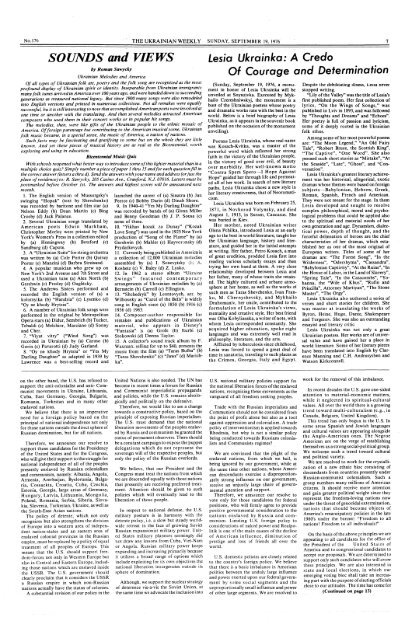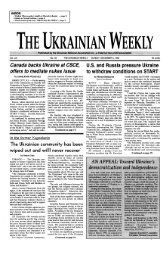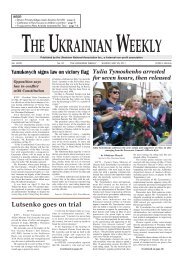The Ukrainian Weekly 1976
The Ukrainian Weekly 1976
The Ukrainian Weekly 1976
Create successful ePaper yourself
Turn your PDF publications into a flip-book with our unique Google optimized e-Paper software.
No. 176 THE UKRAINIAN WEEKLY SUNDAY, SEPTEMBER 19, <strong>1976</strong> 7<br />
SOUNDS and VIEWS<br />
by Roman Sawycky<br />
<strong>Ukrainian</strong> Melodies and America<br />
Of all types of <strong>Ukrainian</strong> folk arJ, poetry and the folk song are recognized as the most<br />
profound display of <strong>Ukrainian</strong> spirit or identity. Inseparable from <strong>Ukrainian</strong> immigrants<br />
many folk tunes arrived in America over 100 years ago, and were handed down to succeeding<br />
generations as treasured national legacy. But since 1900 many songs were also remodeled<br />
into English versions and printed in numerous collections. Not all remakes were equally<br />
successful, bu it is still interesting to note that accomplished American poets were involved at<br />
one time or another with the translating. And then several melodies attracted American<br />
composers who used them in their concert works or in popular hit songs.<br />
<strong>The</strong> melodies, then, were like gifts of the <strong>Ukrainian</strong> people to the ethnic mosaic of<br />
America. Of foreign parentage but contributing to the American musical scene, <strong>Ukrainian</strong><br />
folk music became, in a special sense, the music of America, a nation of nations.<br />
Such facts may be fascinating and gratifying to some but on the whole they are little<br />
known. And yet these pieces of musical history are as real as the Bicentennial, worth<br />
exploring and using in education.<br />
Bicentennial Music Quiz<br />
With schools reopened what better way to introduce some of this lighter material than in a<br />
multiple choice quiz? Simply number apiece of paper 1 thru 15 and for each question fill in<br />
the correct answer (letters a thru d). Send the answers with your name and address (or just the<br />
place of residence) to: R. Sawycky, 205 Casino Ave., Cranford, N.J. 07016. Letters must be<br />
postmarked before October 1st. <strong>The</strong> answers and highest scores will be announced next<br />
month.<br />
1. <strong>The</strong> English version of Mussorgsky's<br />
swinging "Hopak" (text by Shevchenko)<br />
was recorded by baritone and film star (a)<br />
Nelson Eddy (b) Dean Martin (c) Bing<br />
Crosby (d) Jack Palance.<br />
2. Several <strong>Ukrainian</strong> songs translated by<br />
American poets Edwin Markham,<br />
Christopher Morley were printed by New<br />
York's Women's Press in a collection edited<br />
by (a) Hemingway (b) Botsford (c)<br />
Sandburg (d) Capote.<br />
3. A "<strong>Ukrainian</strong> Suite" for string orchestra<br />
was written by (a) Cole Porter (b) Quincy<br />
Porter (c) Mancini (d) Barbra Streisand.<br />
4. A popular musician who grew up on<br />
New York's 2nd Avenue and 7th Street and<br />
used a <strong>Ukrainian</strong> tune (a) Alex North (b)<br />
Gershwin (c) Presley (d) Ouglitzky.<br />
5. <strong>The</strong> Andrews Sisters performed and<br />
recorded the English version of (a) a<br />
kolomyika (b) "Handzia" (c) Lysenko (d)<br />
"Oy ne khody Hrytsiu".<br />
6. A number of <strong>Ukrainian</strong> folk songs were<br />
performed in the original by Metropolitan<br />
Opera stars (a) Didur, Sembrich (b) Tucker,<br />
Tebaldi (c) Melchior, Marciano (d) Sonny<br />
and Cher.<br />
7. "Viyut vitry" ("Wind Song") was<br />
recorded in <strong>Ukrainian</strong> by (a) Caruso (b)<br />
Gorin (c) Pavarotti (d) Judy Garland.<br />
8. "Oy ne khody Hrytsiu" or "Yes My<br />
Darling Daughter" as adapted in 1939 by<br />
Lawrence was a best-selling record and<br />
on the other hand, the U.S. has refused to<br />
support the anti-colonialist and anti- Communist<br />
movements in Ukraine, Lithuania,<br />
Cuba, East Germany, Georgia, Bulgaria,<br />
Romania, Turkestan and in many other<br />
enslaved nations.<br />
We believe that there is an imperative<br />
need for a foreign policy based on the<br />
principal of national independence not only<br />
for those nations outside the direct sphere of<br />
Russian domination, but for all nations.<br />
<strong>The</strong>refore, we announce our resolve to<br />
support those candidates for the Presidency<br />
of the United States and for the Congress,<br />
who will give their support to the struggle for<br />
national independence of all of the peoples<br />
presently enslaved by Russian colonialism<br />
and communism, namely: Albania, Angola,<br />
Armenia, Azerbaijan, Byelorussia, Bulgaria,<br />
Cossackia, Croatia, Cuba, Czechia,<br />
Estonia, Georgia, large areas of Germany,<br />
Hungary, Latvia, Lithuania, Mongolia,<br />
Poland, Romania, Serbia, Siberia, Slovakia,<br />
Slovenia, Turkestan, Ukraine, as well as<br />
the South-East Asian nations.<br />
<strong>The</strong> policy of detente, which not only<br />
recognizes but also strengthens the division<br />
of Europe into a western area of independent<br />
nation-states and an eastern area of<br />
enslaved colonial provinces in the Russian<br />
empire, must be replaced by a policy of equal<br />
treatment of all peoples of Europe. This<br />
means that the U.S. should support freedom-forces<br />
not only in Western Europe but<br />
also in Central and Eastern Europe, including<br />
those nations which are enslaved inside<br />
the USSR. <strong>The</strong> U.S. government should<br />
clearly proclaim that it considers the USSR<br />
a Russian empire in which non-Russian<br />
nations actually have the status of colonies.<br />
A substantial revision of our policy in the<br />
launched the career of (a) Sinatra (b) Jan<br />
Peerce (c) Bobby Darin (d) Dinah Shore.<br />
9. In 1940-41 "Yes My Darling Daughter"<br />
was recroded by bands of (a) Glenn Miller<br />
and Benny Goodman (b) J. P. Sousa (c)<br />
none of these.<br />
10. "Yikhav kozak za Dunay" ("Kozak<br />
Love Song") was used in the 1925 New York<br />
production of "Song of the Flame" by (a)<br />
Gershwin (b) Mahler (c) Hayvoronsky (d)<br />
Prydatkevych.<br />
11. Currently being published in America is<br />
a collection of 12,000 <strong>Ukrainian</strong> melodies<br />
assembled by (a) I. Sonevytsky (b) A.<br />
Koshetz (c) V. Baley (d) Z. Lysko.<br />
12. In 1962 a stereo album "Ukraine<br />
Swings" featured contemporary<br />
arrangements of <strong>Ukrainian</strong> melodies by (a)<br />
Bernstein (b) Carroll (c) Ellington.<br />
13. "Shchedryk" by Leontovych, arr. by<br />
Wilhousky as "Carol of the Bells" is widely<br />
sung in English since (a) 1850 (b) 1916 (c)<br />
1936 (d) 1963.<br />
14. Composer-author responsible for<br />
remakes and publications of <strong>Ukrainian</strong><br />
material, who appears in Disney's<br />
"Fantasia" is (a) Grofe (b) Iturbi (c)<br />
Stokowski (d) Deems Taylor.<br />
15. A collector's sound track album by F.<br />
Waxman, selling for up to S40, presents the<br />
music from the film (a) "Taras Bulba" (b)<br />
"Taras Shevchenko" (c) "Jaws" (d) Marichka".<br />
United Nations is also needed. <strong>The</strong> UN has<br />
become in recent times a forum for Russian<br />
and Communist imperialistic propaganda<br />
and policies, while the U.S. remains ideologically<br />
and politcally on the defensive.<br />
<strong>The</strong>refore, we would like to see a change<br />
towards a constructive policy, based on the<br />
principle of exposing Russian imperialism.<br />
<strong>The</strong> U.S. must demand that the national<br />
liberation movements of the peoples enslaved<br />
by Russia and communism be granted the<br />
status of permanent observers. <strong>The</strong>re should<br />
be a constant campaign to expose the puppet<br />
delegations which do not represent the<br />
sovereign will of the respective peoples, but<br />
only the policy of the Russian overlords.<br />
We believe, that our President and the<br />
Congress must treat the nations from which<br />
we are descended equally with those nations<br />
that presently are receiving preferred treatment.<br />
Attention should be given to such<br />
policies which will eventually lead to the<br />
liberation of those people.<br />
In respect to national defense, the U.S.<br />
military posture is in harmony with the<br />
detente policy, i.e. a slow but steady worldwide<br />
retreat in the face of growing Soviet<br />
Russian expansionist military power. United<br />
States military planners seemingly did<br />
not draw any lessons from Cuba, Viet-Nam<br />
or Angola. Russian military power keeps<br />
expanding and increasing primarily because<br />
it utilizes a broad range of options which<br />
include exploiting for its own objectives the<br />
national liberation insurgencies outside its<br />
sphere of domination.<br />
Although, we support the nuclear strategy<br />
of deterence vis-a-vis the Soviet Union, at<br />
the same time we advocate the inclusion into<br />
Lesia Ukrainka: A Credo<br />
Of Courage and Determination<br />
(Sunday, September 19, <strong>1976</strong>, a monument<br />
in honor of Lesia Ukrainka will be<br />
unveiled at Soyuzivka. Executed by Mykhailo<br />
Czereshniwskyj, the monument is a<br />
bust of the <strong>Ukrainian</strong> poetess whose poetry<br />
and dramatic works rate with the best in the<br />
world. Below is a brief biography of Lesia<br />
Ukrainka, as it appears in the souvenir book<br />
published on the occasion of the monument<br />
unveiling).<br />
Poetess Lesia Ukrainka, whose real name<br />
was Kosach-Kvitka, was a master of the<br />
powerful word which reflected her strong<br />
faith in the victory of the <strong>Ukrainian</strong> people,<br />
in the victory of good over evil, of beauty<br />
over morbidity. Her well-known motto<br />
"Contra Spem Spero-1 Hope Against<br />
Hope" guided her through life and permeated<br />
all of her work. In search of new literary<br />
paths, Lesia Ukrainka chose a new style in<br />
her literary creativeness, that of Neoromaticism.<br />
Lesia Ukrainka was born on February 25,<br />
1871, in Novhorod Volynsky, and died<br />
August 1, 1913, in Suram, Caucasus. She<br />
was buried in Kiev.<br />
Her mother, noted <strong>Ukrainian</strong> writer<br />
Olena Pchilka, introduced Lesia at an early<br />
age to the best in world literature, taught her<br />
the <strong>Ukrainian</strong> language, history and literature,<br />
and guided her in the initial attempts<br />
at writing. Her father, Petro Kosach, a man<br />
of great erudition, prodded Lesia first into<br />
reading various scholarly essays and then<br />
trying her own hand at them. A very close<br />
relationship developed between Lesia and<br />
her father, many of whose traits she retained.<br />
<strong>The</strong> highly cultured and urbane atmosphere<br />
at her home, as well as the works of<br />
such men as Taras Shevchenko, Ivan Franko,<br />
M. Chernyshevsky, and Mykhailo<br />
Drahomaniv, her uncle, contributed to the<br />
formulation of Lesia Ukrainka's views,<br />
mentality and creative style, Her best friend<br />
was Olha Kobylianska, a writer of note, with<br />
whom Lesia corresponded constantly. She<br />
acquired higher education, spoke eight<br />
languages and was extremely well read in<br />
philosophy, literature, and the arts.<br />
Afflicted by tuberculosis since childhood,<br />
Lesia was forced to spend a great deal of<br />
time in sanatoria, traveling to such places as<br />
the Crimea, Georgia, Italy and Egypt.<br />
U.S. national military policies support foi<br />
the national liberation forces of the enslaved<br />
nations, recognizing these movements as the<br />
vanguard of all freedom seeking peoples.<br />
Trade with the Russian imperialists and<br />
Communists should not be considered from<br />
the point of profit alone but also as a tool<br />
against oppression and colonialism. A trade<br />
policy of interventionism is applied towards<br />
Rhodesia, but why is not a similar policy<br />
being conducted towards Russians colonialists<br />
and Communists regimes?<br />
We are convinced that the plight of the<br />
enslaved nations, from which we hail, is<br />
being ignored by our government, while at<br />
the same time other nations, whose American<br />
descendants exercise a disproprotionately<br />
strong influence on our government,<br />
receive an unjustly large share of governmental<br />
attention and support.<br />
<strong>The</strong>refore, we announce our resolve to<br />
vote only for those candidates for federal<br />
positions, who will firmly agree to provide<br />
positive governmental consideration to the<br />
nations enslaved by Russia and communism.<br />
Limiting U.S. foreign policy to<br />
considerations of naked power and Realpolitik<br />
is one of the main causes of the decline<br />
of American influence, diminution of<br />
prestige and loss of friends all over the<br />
world.<br />
U.S. domestic policies are closely related<br />
to the country's foreign policy. We believe<br />
that there is a basic imbalance in American<br />
politics between the unduly large influence<br />
and power exerted upon our federal government<br />
by some social segments and the<br />
unproportionally small influence and power<br />
of other large segments. We are resolved to<br />
Despite the debilitating illness, Lesia never<br />
stopped writing.<br />
"Lily of the Valley" was the title of Lesia's<br />
first published poem. Her first collection of<br />
lyrics, "On the Wings of Songs," was<br />
published in Lviv in 1893, and was followed<br />
by "Thoughts and Dreams" and "Echoes".<br />
Her poetry is full of passion and lyricism,<br />
some of it deeply rooted in the <strong>Ukrainian</strong><br />
folk ethos.<br />
Among some of her most powerful poems<br />
are: "<strong>The</strong> Moon Legend," "An Old Fairy<br />
Tale", "Robert Bruce, the Scottish King",<br />
"<strong>The</strong> Captive", "One Word". She also<br />
penned such short stories as "Mistake", "At<br />
the Seaside", "Late", "Ghost", and "Conversation".<br />
Lesia Ukrainka's greatest literary achievement<br />
was her historical, allegorical, exotic<br />
dramas whose themes were based on foreign<br />
subjects—Babylonian, Hebrew, Greek,<br />
Roman, Spanish, French and American.<br />
<strong>The</strong>y were not meant for the stage. In them<br />
Lesia developed and sought to resolve<br />
complex philosophical, moral and psychological<br />
problems that could be applied also<br />
to the spiritual and material needs of her<br />
own generation and age. Dynamism, dialectical<br />
power, depth of thought, and the<br />
forceful delineation of heroes are the chief<br />
characteristics of her dramas, which established<br />
her as one of the most original of<br />
European writers. Titles of some of her<br />
dramas are: "<strong>The</strong> Forest Song", "In the<br />
Wilderness", "Oderzhyma", "Cassandra",<br />
"Babylonian Captivity", "At the Ruins", "In<br />
the House of Labor, in the Land of Slavery",<br />
"Spring Tale", "In the Catacombs", "Yohanna,<br />
the "Wife of Khus", "Rufm and<br />
Priscilla", Attorney Martiyan", "<strong>The</strong> Stone<br />
Master", "<strong>The</strong> Orgy".<br />
Lesia Ukrainka also authored a series of<br />
verses and short stories for children. She<br />
was master at translating the works of<br />
Byron, Heine, Hugo, Dante, Shakespeare<br />
and Turgenev. She was also an outstanding<br />
essayist and literary critic.<br />
Lesia Ukrainka was not only a great<br />
<strong>Ukrainian</strong> poetess. Her works are of universal<br />
value and have gained her a place in<br />
world literature. Some of her literary pieces<br />
have been translated into English by Clarence<br />
Manning and C.H. Andrusyshen and<br />
Watson Kirkconnell.<br />
work for the removal of this imbalance.<br />
In recent decades the U.S. gave one-sided<br />
attention to material-economic matters,<br />
while it neglected its spiritual-cultural<br />
values. All over the world there is a growing<br />
trend toward multi-culturalism (e.g., in<br />
Canada, Belgium, United Kingdom).<br />
This trend has only begun in the U.S. In<br />
some areas Spanish and Jewish languages<br />
and cultural values are appearing alongside<br />
the Anglo-American ones. <strong>The</strong> Negroe<br />
American are on the verge of establishing<br />
themselves as a strong social-political group.<br />
We welcome such a trend toward cultural<br />
and political variety.<br />
We are resolved to work for the crystallization<br />
of a new ethnic bloc consisting of<br />
descendants from countries presently under<br />
Russian-communist colonialism. Such a<br />
group numbers many millions of American<br />
citizens. It should receive more attention<br />
and gain greater political weight since they<br />
represent the freedom-loving nations now<br />
under the threat of genocidal extermination,<br />
nations that should become objects of<br />
America's emancipatory policies in the late<br />
1980's under the banner: "Freedom to all<br />
nations! Freedom to all individuals!"<br />
On the basis of the above principles we are<br />
appealing to all candidates for the office of<br />
the President of the United States of<br />
America and to congressional candidates to<br />
accept our proposals. We are determined to<br />
support only such candidates who will avow<br />
these principles. We are also interested in<br />
state and local elections, in which our<br />
emerging voting bloc shall take an increasing<br />
part with the purpose of electing officials<br />
close to our attitudes. <strong>The</strong> time has come for<br />
(Continued on page 13)

















